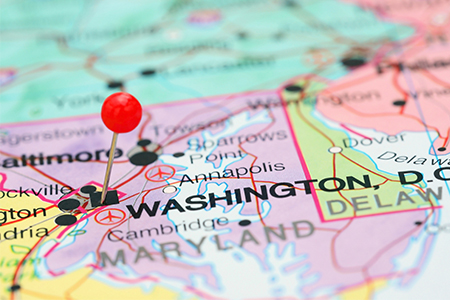You May Also Like
WASHINGTON DC CPA EXAM & LICENSE REQUIREMENTS 2024
Keep reading to learn how to become a CPA in Washington, D.C.

The accountancy profession is one of history’s oldest known professions, keeping the books orderly behind trade routes, taxation rates and the building projects that awe us to this day. Accountants keeps workers paid and resources available. If you are seeking a career in accountancy, you will surely be able to find solid work in any sort of economic environment, particularly if you hold the highest license—that of the Certified Public Accountant (CPA). Every state has its own criteria for its CPA licensees and Washington, D.C. is no exception. Keep reading to learn how to become a CPA in Washington, D.C.
The District of Columbia is like most other states in that it has a multi-tiered process in place to earn its CPA license. It has specific requirements for education, the CPA examination and experience. Unlike many states, there is no requirement for an ethics test, however you will need to be at least 18 years old and have 150 semester hours of college credit, inclusive of a bachelor’s degree. The District of Columbia Board of Accountancy has no requirements for district residency or U.S. citizenship, though you will need to have a Social Security number. If you do not yet have a SSN but are eligible to work in the United States, you may contact the board to petition the requirement.
Academic Standards
The board requires that all applicants have a minimum of 150 semester hours of college-level work on their transcripts to both qualify for licensure as well as to sit for the CPA examination. This is not an unusual requirement, as many state boards have the same criteria. However, it is important to note the specifics of the District’s requirements.
First, make sure that your college or university is properly accredited. The board asks that your credentials be supported and acknowledged by accreditation from one of these agencies:
- D.C. Education Licensure Commission
- Western Association of Schools and Colleges
- Middle States Association of Colleges and Schools
- Southern Association of Colleges and Schools
- New England Association of Schools and Colleges
- Northwest Commission on Colleges and Universities
- North Central Association of Colleges and Schools
If you graduated or otherwise received credits from a foreign institution, those credits must be evaluated and supported by the National Association of Credential Evaluation Services (NACES).
Once you know that your credits will count towards your CPA license, you can proceed with your education. Work with your advisor to ensure that your coursework meets the board’s standards. The required coursework is as follows:
- Commercial Law–Three semester hours
- Financial Accounting–Three semester hours
- Auditing–Three semester hours
- Cost Accounting–Three semester hours
- Federal Income taxes–Three semester hours
Other accounting and related courses such as these:
- Business Law–Three semester hours
- Accounting Theory–Three semester hours
- Advanced Accounting–Three semester hours
- Forensic Accounting–Three semester hours
Once you have completed the required coursework for the board, you can have your official transcripts and a full, signed and notarized application sent directly to them. When your application has been processed and accepted, you will receive notice that you may schedule a time to take the Uniform CPA Exam.
The CPA Examination is perhaps the most difficult professional test in the nation. It is developed and distributed by the American Institute of Certified Public Accountants. Practicing CPAs frequently contribute and design new test items for the exam to reflect contemporary issues in accountancy. It is a four-part exam and many people—up to half—must retake all or part of it. The four parts of the exam are:
- Financial Accounting and Reporting (FAR)–This section covers financial reporting frameworks from several industry experts. Candidates are asked to compare statements that reflect different reporting standards.
- Auditing and Attestation (AUD)–This is a test of your knowledge of the International Standards of Auditing as well as U.S. standards.
- Regulation (REG)–Your professional and legal responsibilities are covered in this test.
- Business Environment and Concepts (BEC)–This portion covers general business concepts and international business. Written communication skills are vital to complete much of the test.
A Two-Tiered District
Washington D.C. allows you to pass the test and yet not proceed to full licensure. You can forgo the experience portion of the process if you desire to work in some other industry while using CPA credentials. Frequently, financial advisors, corporate bankers and lawyers may desire the credentials though they do not work in accountancy. Note that without a full license, you will not be allowed to sign taxation documents or similar paperwork.
Experience
For full licensure, you will need to work in accountancy for 2,000 hours. This time must be accounted for and verified by a licensed CPA. You will need to demonstrate competency in areas such as these:
- Accounting
- Attestation
- Compilation
- Taxation
- Consultation
- Advisory Services–Financial or Managerial
Your experience will be documented on a Certificate of Experience to be signed, notarized and submitted to the board at the following address:
Pearson VUE DC-AC
Metro-Plex I
Suite 250, 8401 Corporate Drive
Landover, MD 20785
As a CPA in the District of Columbia, you are sure to find a wide range of practice areas, not only in governmental accounting. There are many large and small businesses, wealth advisory needs and even a healthy demand for forensic accountants. Visit the board’s website to stay current with all licensure matters: District of Columbia Board of Accountancy.